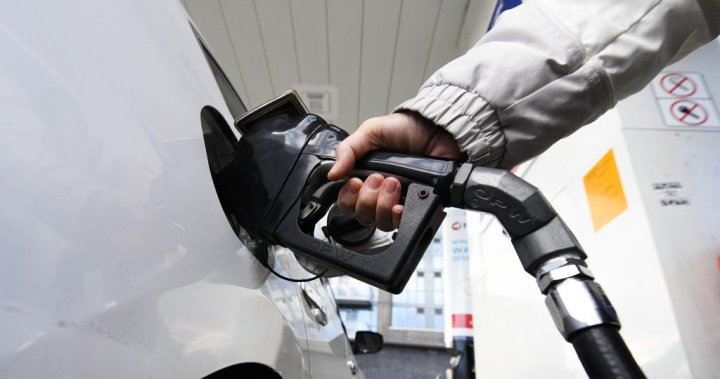As the federal consumer carbon price ends on April 1, Canadians could notice a “significant” change in costs when they head to the gas station — though whether it lasts amid global uncertainty is less clear.
Patrick De Haan, head of petroleum analysis at GasBuddy.com, told Global News in an interview that regardless of where you live in the country, consumers should see an average drop in gas costs of 15 to 16 cents per litre. Those savings could even be higher for diesel users at about 20 cents per litre.
“The federal carbon tax being paused is really going to give every province some form of relief here over the next, I’ll call it 48 hours,” he said.
However, he cautioned while the carbon price is typically a line item in a station’s point of sale system that can be removed right at midnight, there may still be some gas stations that have to manually remove it, so it might not be right away that you’ll see the shift.
According to De Haan, while it’s been estimated there could be up to a 17.6 cent per litre drop — the current rate of the carbon price, the three per cent rise in crude oil prices that happened on Monday means there is a slight decrease in exactly how much savings will be seen.
But he added overall, it will still be noticeable.
Get breaking National news
For news impacting Canada and around the world, sign up for breaking news alerts delivered directly to you when they happen.
“Keep in mind, gas prices don’t just move for one lever at a time. There are many different levers that can drive prices up or down all at the same time,” he added. “So while this is a fairly big lever that’s going to help prices go down significantly, the price of oil, the underlying cost of oil is also going up.”
He estimated the average consumer who may fill up their gas tank weekly could see savings of about $6, but that would amount to approximately $300 saved over the course of a year.
The consumer carbon price was billed by former prime minister Justin Trudeau as putting a price on pollution to get people to use fewer fossil fuels, but has faced criticism since it was put in place and pushback at both the federal and provincial levels.
The industrial price remains in place.
The Canada Carbon Rebate, which saw quarterly tax-free payments delivered to eligible Canadians, was used to try to offset the increases in prices paid by consumers, with Ottawa saying about 80 per cent of Canadians were getting back more than what they were paying.
But shortly after he was sworn in as prime minister, Mark Carney signed an order-in-council to begin the process to end the consumer fuel charge “immediately,” with it to take effect April 1.
The rebate is also set to come to an end with the final payment set to be made to Canadians’ bank accounts in April.
Shortly after the process to end the pricing plan was signed, economist Moshe Lander told Global News that while prices could drop at the gas station, he cautioned with the rebate also cancelled there will be a “bit of a hole.”
“Even if we were to say the average family is losing out on $150 to $500, put that over 365 days and you’re talking about a couple of Timbits to a small cup of coffee at Tim Hortons,” he said.
GasBuddy.com says the average cost per litre of gas across the country is $1.55, about four cents cheaper than this time last year.
Some provinces are also preparing for higher demand due to the upcoming summer season and a changeover of gasoline due to the same seasonal changes. Despite this, De Haan estimates it won’t offset what people will see saved at the pump, which means “lower prices throughout the rest of the year.”
“It’s going to be significant year in and year out,” De Haan said. “Under the old regime, the carbon tax would continue going up every April 1, so, in essence, it’s going to be significant savings.”
© 2025 Global News, a division of Corus Entertainment Inc.

